Introduction
Businesses are constantly seeking the most effective ways to reach and engage their customers. This pursuit has led to the emergence of two prominent marketing strategies: omnichannel vs multichannel marketing.
While both approaches aim to leverage multiple channels for customer interaction, they differ significantly in their execution and overall customer experience.
Recent statistics highlight the growing importance of these strategies. According to a study by Google, 98% of Americans switch between devices on the same day, underscoring the need for seamless cross-channel experiences.
Furthermore, a report by Harvard Business Review found that 73% of customers use multiple channels during their shopping journey.
The distinction between omnichannel vs multichannel marketing lies in how these channels are integrated and the resulting customer experience. Multi-channel marketing involves using various channels independently, while omni-channel marketing creates a cohesive, integrated experience across all touchpoints.
As we delve deeper into the omnichannel vs multichannel marketing debate, it's crucial to understand that the choice between these strategies can significantly impact a brand's ability to meet evolving customer expectations.
This article aims to clarify the key differences between omnichannel vs multichannel marketing, helping businesses make informed decisions about their marketing strategies in an increasingly interconnected world.
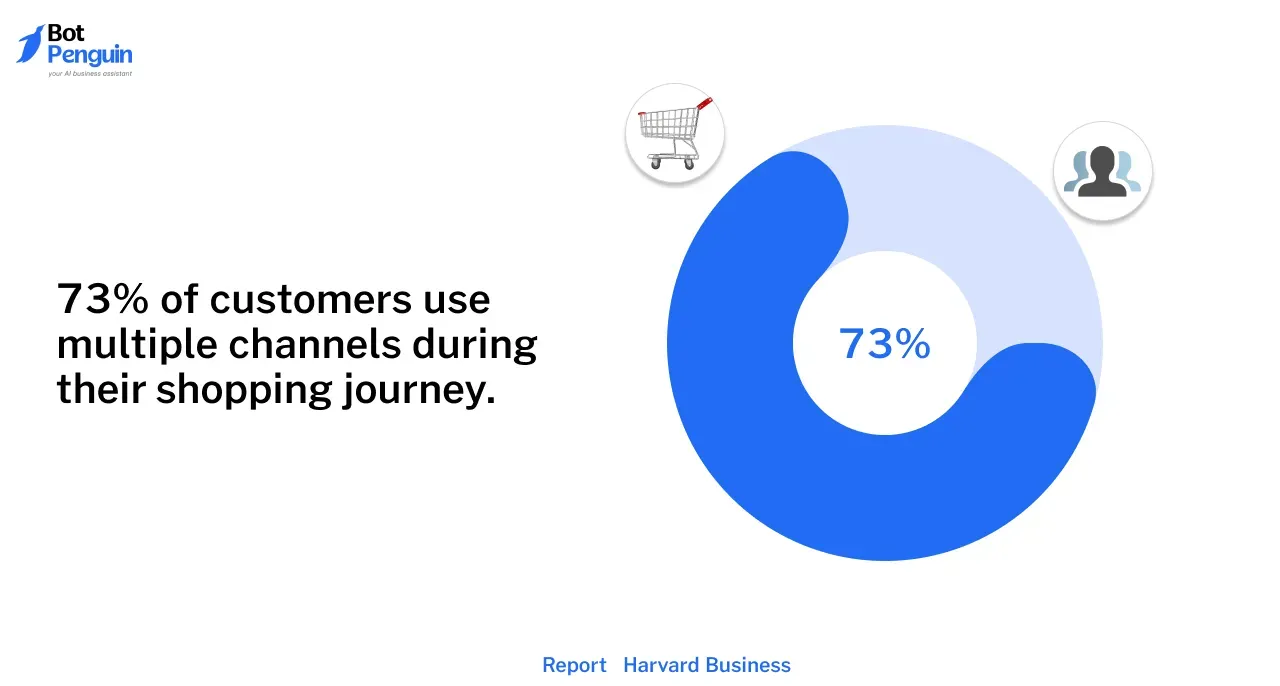
What is Omnichannel Marketing?
Omnichannel marketing creates a seamless experience for customers across all platforms. It integrates various channels, allowing customers to switch between them smoothly.
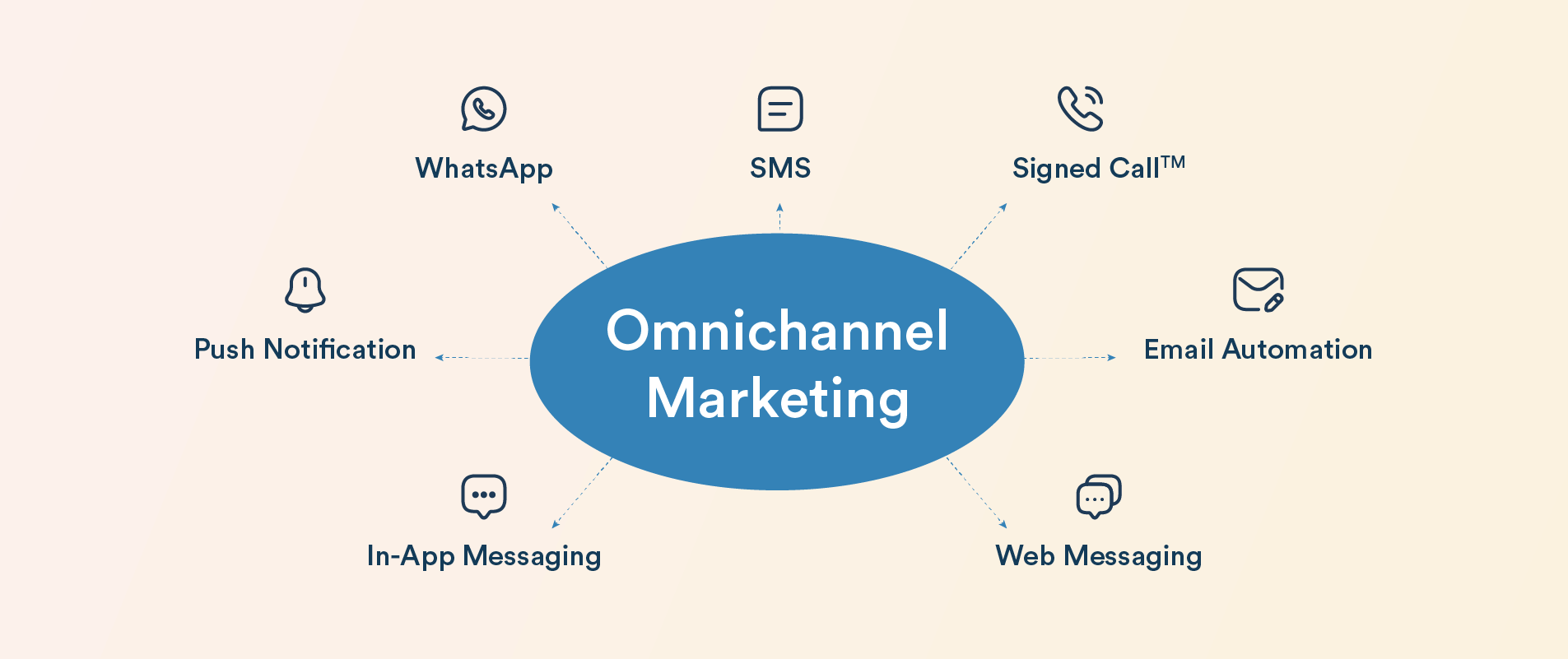
This approach ensures that the customer journey is consistent and connected, whether they are shopping online, in-store, or on a mobile app.
Key Features of Omnichannel Marketing
Given below are key features of omnichannel marketing while comparing omnichannel vs multichannel marketing:
- Integration Across Channels: Omnichannel marketing connects all platforms, from social media and email to physical stores. This integration means customers receive a unified experience.
- Consistent Messaging: Messaging and branding are consistent across all channels. Whether a customer interacts with a brand via email or in-store, the message remains the same.
- Customer-Centric Approach: This strategy focuses on the customer’s needs and preferences. It aims to provide a personalized experience by understanding and anticipating customer behavior.
- Data-Driven Decisions: Omnichannel marketing relies on data from various channels. This data helps businesses understand customer preferences and improve their marketing strategies.
Examples of Omnichannel Marketing
Here are some examples of omnichannel marketing:
- Starbucks: The Starbucks rewards program is a great example of omnichannel marketing. Customers can reload their cards via mobile app, website, or in-store.
All changes are updated in real-time across all platforms.
- Disney: Disney's website and mobile app provide a seamless experience. Customers can plan their trip, book tickets, and check wait times for rides.
The experience is integrated, making it easy to switch between platforms.
- Sephora: Sephora integrates its online and in-store experiences. Customers can check product availability online and purchase in-store.
The Beauty Insider program allows customers to access their profiles and rewards across all channels.
What is Multichannel Marketing?
Multichannel marketing involves using multiple platforms to reach customers. Unlike omnichannel marketing, these channels are not necessarily connected.
Each channel operates independently, aiming to engage customers through various touchpoints.
Key Features of Multichannel Marketing
Given below are key features of multi-channel marketing while comparing omnichannel vs multichannel marketing:
- Multiple Touchpoints: Multichannel marketing uses different platforms like social media, email, and physical stores to reach customers.
- Channel-Specific Strategies: Each channel has its own strategy. The messaging and approach can vary between platforms, allowing for customization.
- Broader Reach: By using multiple channels, businesses can reach a wider audience. Each channel can target different segments of the market.
- Flexibility: Businesses can experiment with different strategies on each platform. This flexibility allows for testing and optimization.
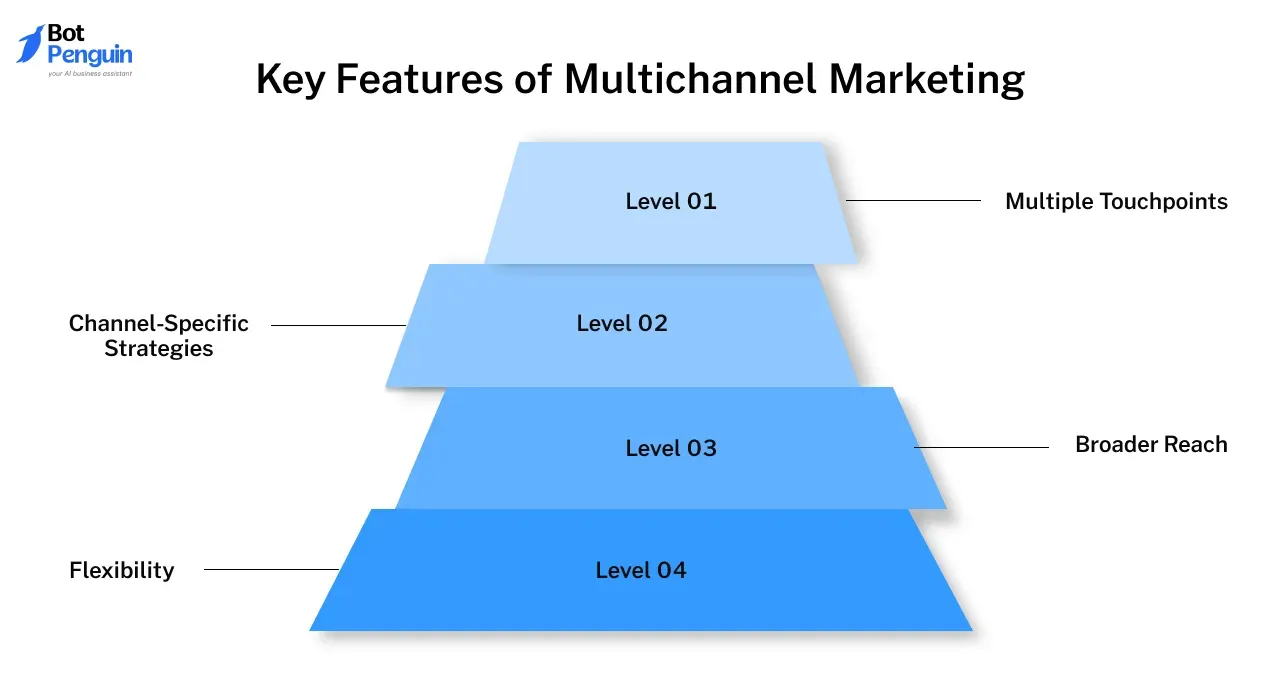
Examples of Multichannel Marketing
Here are some examples of multi channel marketing:
- Coca-Cola: Coca-Cola uses TV, social media, and outdoor advertising to reach customers. Each channel has a unique campaign, targeting different audiences.
- Nike: Nike engages customers through its website, social media, and physical stores. Each channel offers different content and promotions, catering to diverse customer preferences.
- Amazon: Amazon uses email marketing, online ads, and its website to engage customers. Each channel operates independently, providing various ways to interact with the brand.
Key Differences Between Omnichannel vs Multichannel Marketing
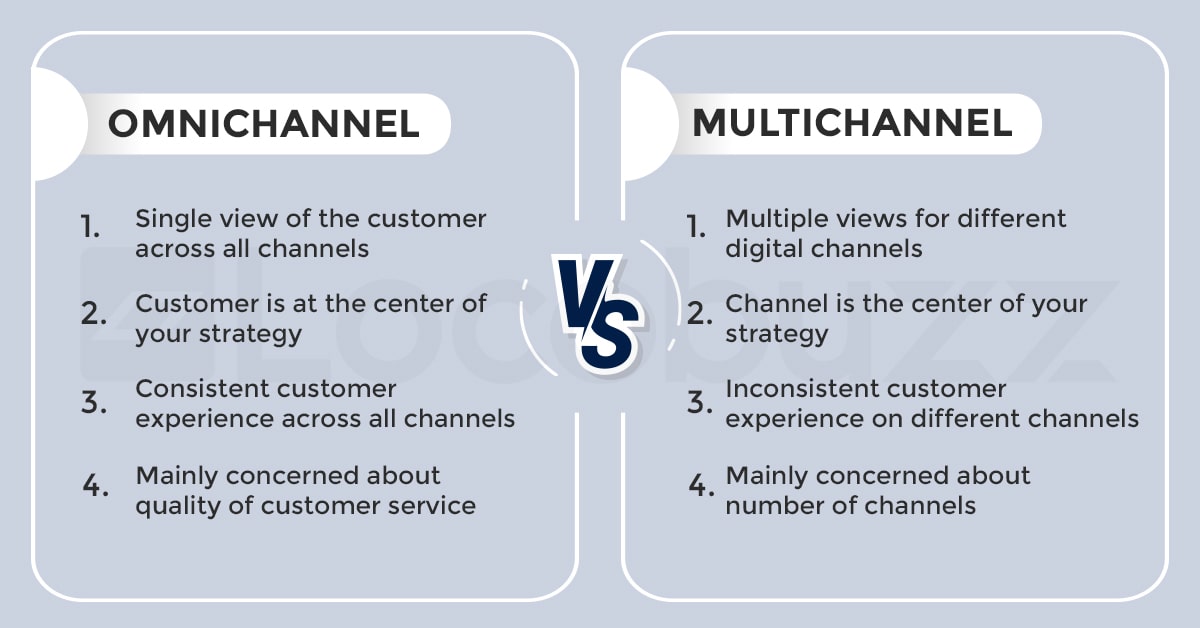
Understanding the key differences between omnichannel vs multichannel marketing can help businesses choose the right strategy.
Each approach has unique features and benefits that can significantly impact customer engagement and satisfaction.
Here’s a detailed look at omnichannel vs multichannel marketing:
Integration and Consistency: How Channels Are Integrated
Omnichannel marketing integrates all channels into a single, cohesive system. Each platform works together, providing a seamless experience for the customer.
For example, a customer might start shopping on a mobile app, continue on a desktop, and finish the purchase in-store, with all interactions connected.
Multichannel marketing, on the other hand, operates with separate, independent channels. Each platform, such as email, social media, and physical stores, functions independently.
The customer's interactions on one channel do not affect their experience on another.
Customer Experience: Seamlessness and Continuity
In omni-channel marketing, the focus is on creating a smooth and continuous customer journey.
All touchpoints are connected, ensuring the customer can switch between channels without interruption. This approach aims to make the customer feel valued and understood throughout their journey.
In multi-channel marketing, the customer experience varies across different platforms. Each channel offers a distinct interaction.
While this can provide variety, it may also lead to a fragmented experience. Customers might receive different messages and offers depending on the channel they use.
Communication Channels: Number and Type of Channels Used
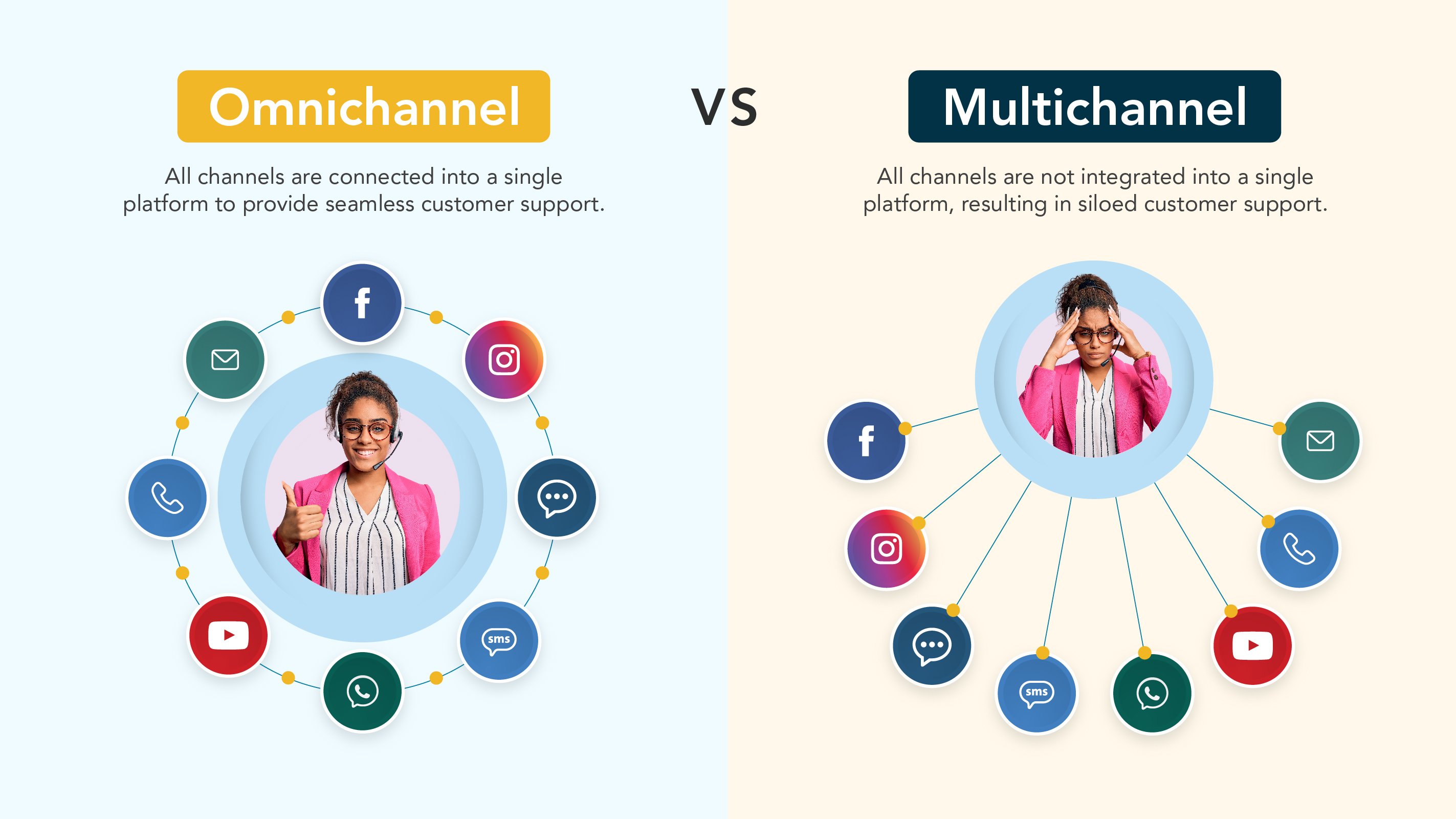
Omnichannel marketing uses multiple channels but integrates them into a unified strategy. This could include websites, mobile apps, social media, email, and physical stores, all working together seamlessly.
Multichannel marketing also uses various channels, but each operates independently. Businesses engage customers through separate email campaigns, social media posts, and in-store promotions, without linking these efforts together.
Technology and Data Use: Data Collection and Utilization
In omnichannel vs multichannel marketing, data use is a significant differentiator. Omnichannel marketing relies heavily on data integration across all channels. This data helps businesses understand customer behavior and preferences, allowing for a more personalized experience.
Multichannel marketing collects data from each channel separately. This means insights from social media campaigns are not necessarily linked to in-store data.
While each channel can be optimized individually, the overall customer insight is limited compared to omnichannel strategies.
Personalization: Level of Tailored Customer Interactions

Omnichannel marketing excels in personalization. By integrating data from various channels, businesses can create highly personalized experiences.
Customers receive relevant recommendations and offers based on their behavior across all touchpoints.
Multichannel marketing offers personalization within individual channels. For example, an email campaign might be tailored based on past purchases.
However, this personalization does not extend across all customer interactions, leading to a less cohesive experience.
Suggested Reading:
Multi-channel communication: Top Tools and Features
Marketing Strategy: Approach and Focus
Omnichannel marketing focuses on creating a unified, customer-centric strategy. The goal is to ensure every interaction adds value to the overall customer journey. This requires a holistic approach, integrating all marketing efforts.
Multichannel marketing, however, adopts a channel-centric approach. Each platform is treated as a separate entity, with its own strategy and goals. This can lead to strong individual campaigns, but may lack the coherence of an omnichannel approach.
Customer Journey: Tracking and Engagement
In omnichannel marketing, the customer journey is meticulously tracked across all channels. Businesses can see how customers move from one touchpoint to another and tailor their strategies accordingly. This ensures a smooth and engaging experience.
In multichannel marketing, the customer journey is tracked within each channel separately. This can make it harder to understand the overall journey.
While each channel may perform well independently, the lack of integration can result in missed opportunities for engagement.
Pros and Cons of Omnichannel vs Multichannel Marketing
Both omnichannel and multichannel marketing strategies have their advantages and challenges. Knowing these can help businesses decide which approach is best for their needs.
Here’s a concise overview of the pros and cons of each.
Pros of Omnichannel Marketing
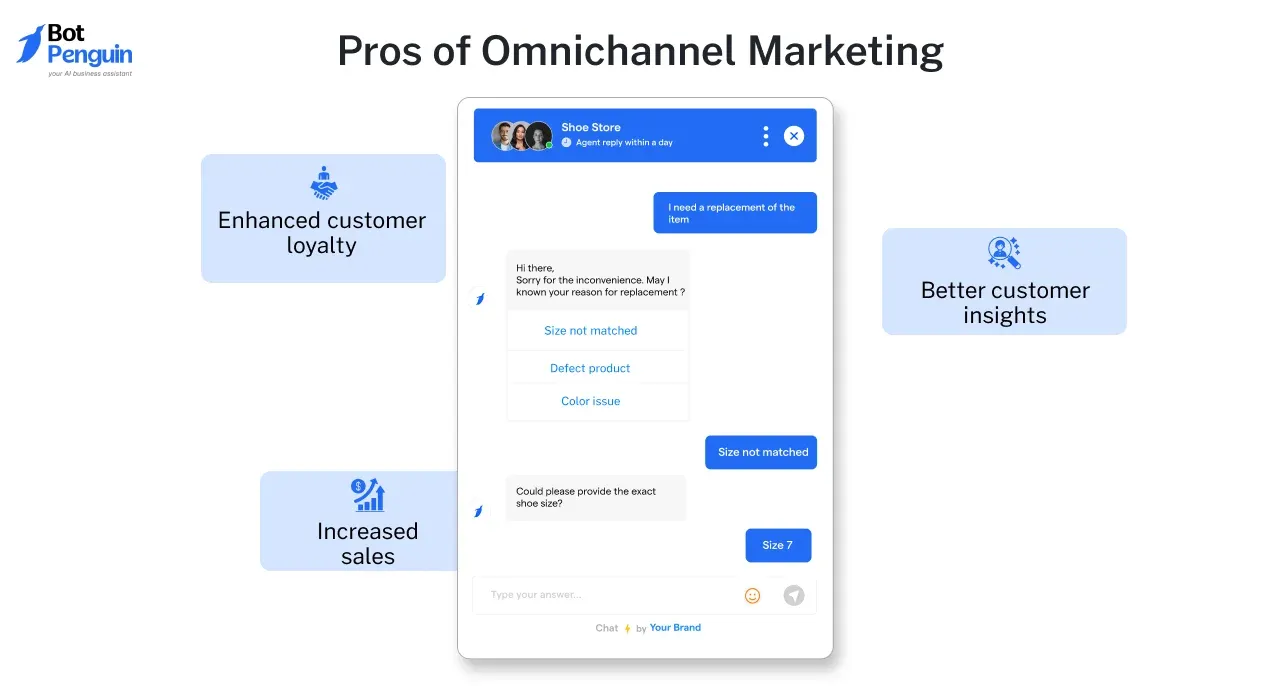
Given below are certain advantages of omnichannel marketing:
- Enhanced customer loyalty: Omnichannel marketing creates a seamless experience across all touchpoints. This consistency builds trust and loyalty, as customers feel understood and valued.
- Better customer insights: By integrating data from all channels, businesses gain a comprehensive view of customer behavior. This insight helps in tailoring marketing efforts more effectively.
- Increased sales: A unified customer experience often leads to higher sales. Customers are more likely to complete purchases when they can switch between channels effortlessly.
Multichannel Marketing Pros
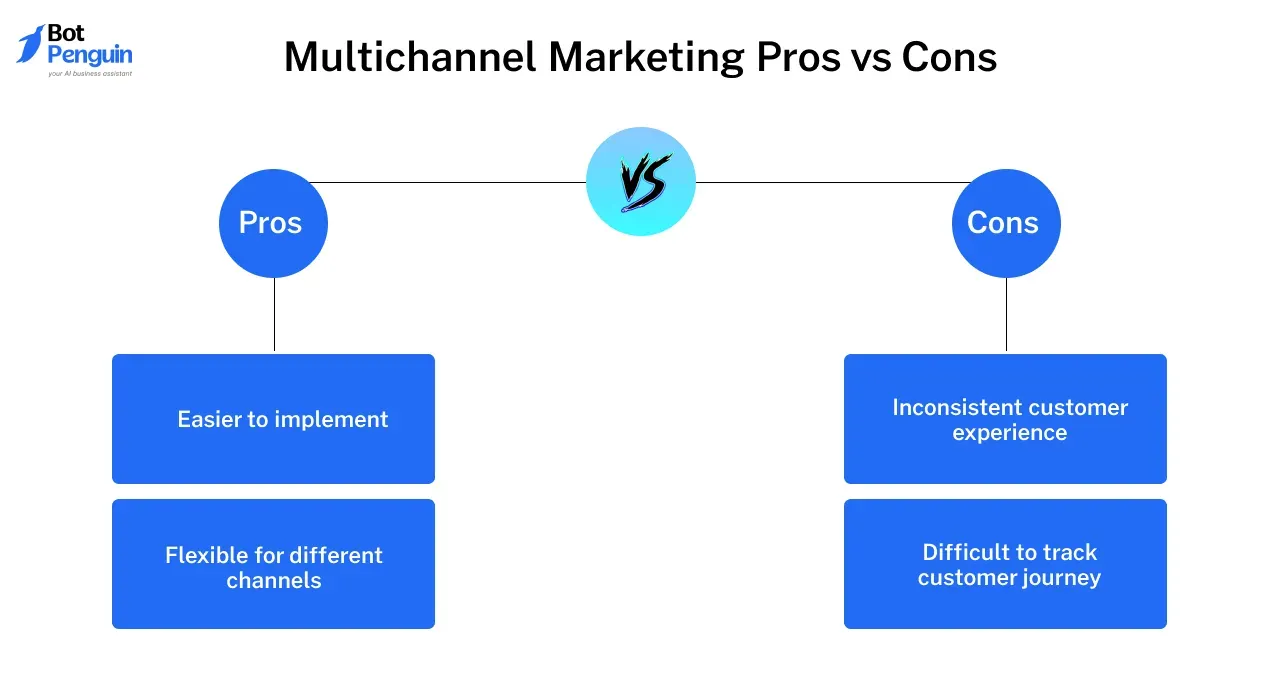
- Easier to implement: Multichannel marketing is simpler to set up. Each channel operates independently, requiring less coordination and integration.
- Flexible for different channels: This approach allows businesses to tailor strategies to specific platforms. Each channel can have its own unique campaign, suited to its audience.
Cons of Omnichannel Marketing
Given below are certain disadvantages of omnichannel marketing:
- Higher implementation costs: Omnichannel marketing can be expensive to implement. It requires significant investment in technology and resources to integrate all channels seamlessly.
- Requires sophisticated technology: This approach needs advanced technology to track and connect customer interactions across various platforms. Businesses must invest in robust systems to manage this complexity.
Multichannel Marketing Cons
- Inconsistent customer experience: Because each channel operates independently, customers might experience inconsistencies. This can lead to confusion and a fragmented brand perception.
- Difficult to track customer journey: Tracking the overall customer journey is challenging in multichannel marketing. Each platform collects data separately, making it hard to understand how customers move between channels.
Suggested Reading:
10 Best Practices for Omnichannel Customer Service
Choosing the Right Strategy Between Omnichannel vs Multichannel Marketing For Your Business
Choosing between omnichannel and multichannel marketing strategies depends on various factors. Your business goals, resources, target audience, and existing channels all play a role.
Here’s how to make the best choice for your business.
Assessing Business Goals and Resources
Evaluate your business goals. If you aim for a seamless customer experience and long-term loyalty, omni-channel marketing might be the way to go.
However, this approach requires significant investment in technology and resources. If your goals include rapid growth with less initial investment, multi-channel marketing could be more suitable.
Understanding Your Target Audience
Know your audience. If your customers interact with your brand across multiple platforms and expect a consistent experience, omnichannel vs multichannel marketing strategies might be necessary.
On the other hand, if your audience engages primarily through specific channels, focusing on those with multi-channel marketing can be effective.
Suggested Reading:
Tips & Tricks for Efficient Multi-channel Communication
Evaluating Existing Marketing Channels
Consider the marketing channels you already use. If you have well-established channels that operate independently, enhancing them with multichannel marketing might be easier.
If you’re starting fresh or looking to overhaul your strategy, investing in an integrated omnichannel approach could provide significant benefits.
Making an Informed Decision
After assessing your goals, audience, and channels, decide which strategy aligns best with your business needs.
Both omnichannel vs multichannel marketing have their advantages and challenges. Ensure your decision supports your overall business objectives and customer expectations.
Conclusion
In conclusion, the debate between multichannel vs omnichannel marketing strategies highlights the evolving nature of customer engagement in today's digital landscape.
While multi-channel marketing offers a diverse range of touchpoints, omni-channel marketing takes this approach a step further by providing a seamless, integrated experience across all channels.
The key difference between omnichannel vs multichannel marketing lies in the level of integration and customer-centricity. Omni-channel marketing focuses on creating a cohesive brand experience, regardless of where or how a customer interacts with the business.
In contrast, multi-channel marketing, while utilizing various platforms, may lack the same level of integration and consistency.
As businesses strive to meet the ever-changing expectations of consumers, the shift from multichannel to omnichannel strategies becomes increasingly important.
Omni-channel marketing allows for a more personalized, efficient, and satisfying customer journey, potentially leading to increased loyalty and higher conversion rates.
Ultimately, the choice between omnichannel vs multichannel marketing depends on a company's resources, target audience, and overall business goals.
However, as technology continues to advance and customer expectations rise, adopting an omni-channel approach may become necessary for businesses looking to stay competitive in the long run.
Frequently Asked Questions (FAQs)
What is the main difference between omnichannel vs multichannel marketing?
Omnichannel marketing integrates all customer touchpoints for a seamless experience, while multichannel marketing uses multiple independent channels without integration, leading to separate, unconnected customer interactions.
Which strategy is better for customer loyalty: omnichannel vs multichannel marketing?
Omnichannel marketing is better for customer loyalty because it provides a consistent and personalized experience across all channels, making customers feel valued and understood.
Is omnichannel marketing more expensive than multichannel marketing?
Yes, omnichannel marketing is generally more expensive due to the need for sophisticated technology and resources to integrate and manage all customer touchpoints seamlessly.
Can small businesses benefit from omnichannel marketing?
Small businesses can benefit from omnichannel marketing if they have the resources to implement and maintain it, as it enhances customer experience and loyalty, potentially driving higher sales.
What are the advantages of multichannel marketing?
Multichannel marketing is easier to implement, offers flexibility for different channels, and allows businesses to reach a wider audience through various independent platforms.
How does omnichannel marketing improve customer insights?
Omnichannel marketing improves customer insights by integrating data from all touchpoints, providing a comprehensive view of customer behavior and preferences, which helps in creating personalized marketing strategies.



